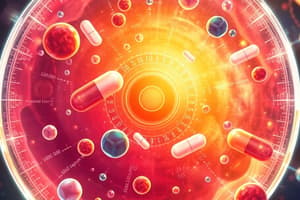Podcast
Questions and Answers
Pharmacodynamics is the study of biochemical interactions of drugs and their sites of _____.
Pharmacodynamics is the study of biochemical interactions of drugs and their sites of _____.
activity
Which of the following is a study of the economic factors impacting the cost of drug therapy?
Which of the following is a study of the economic factors impacting the cost of drug therapy?
- Pharmacognosy
- Pharmacokinetics
- Pharmacoeconomics (correct)
- Pharmacodynamics
What is the generic name?
What is the generic name?
The name that is derived from the chemical name.
What is an adverse drug reaction?
What is an adverse drug reaction?
A therapeutic effect is the response after a treatment that is achieved from the medications.
A therapeutic effect is the response after a treatment that is achieved from the medications.
What is peak time?
What is peak time?
What is metabolism in pharmacology?
What is metabolism in pharmacology?
Half-life refers to the time it takes for a drug to be absorbed to ____% of its potential.
Half-life refers to the time it takes for a drug to be absorbed to ____% of its potential.
Which of the following defines medication reconciliation?
Which of the following defines medication reconciliation?
Match the following drug interaction types:
Match the following drug interaction types:
Which group of people require smaller doses of medication due to size and underdevelopment of some organs?
Which group of people require smaller doses of medication due to size and underdevelopment of some organs?
Flashcards are hidden until you start studying
Study Notes
Pharmacology Terminology
- Pharmacodynamics: Study of how drugs interact with the body at a molecular level.
- Pharmacoeconomics: Analysis of the cost-effectiveness of drug therapy.
- Pharmacogenomics: Investigating how genetics influence drug responses.
- Pharmacognosy: Studying drugs derived from natural sources like plants.
- Pharmacokinetics: Examining how drugs are absorbed, distributed, metabolized, and excreted.
- Pharmacology: The overarching study of drugs and their effects.
- Pharmacotherapeutics: Treatment of diseases using drugs, also known as therapeutics.
Drug Therapy
- Generic Name: The official, non-proprietary name of a drug based on its chemical structure.
- Trade Name: The brand name given by the pharmaceutical company producing the drug.
- Pharmacotherapeutics: The use of drugs to treat diseases or conditions.
- Adverse Drug Reaction (ADR): A harmful or unintended effect resulting from a drug or health product.
Drug Interactions and Effects
- Synergistic Effect: When two drugs combined produce a greater effect than the sum of their individual effects.
- Therapeutic Effect: The desired effect of a drug, the intended outcome of the treatment.
- Additive Effect: When two combined drugs have an effect equal to the sum of their individual effects.
Drug Movement in the Body
- Distribution: The process of a drug moving from the bloodstream to various tissues and organs.
- Metabolism: The breakdown of drugs by the body, primarily through enzymatic processes.
- Excretion: The elimination of drugs and their metabolites from the body through various pathways like urine, feces, and sweat.
Drug Time Course
- Half-life: The time it takes for the drug's concentration in the body to decrease by half.
- Peak: The time at which the drug reaches its highest concentration in the body.
- Onset: The time it takes for the drug to start producing its therapeutic effect.
- Duration: The length of time the drug's therapeutic effect persists.
Nursing Care Plan
- ADPIE: An acronym for the nursing process: Assessment, Diagnosis, Planning, Implementation, and Evaluation. The nursing process is crucial for safe and effective medication administration.
- Medication Reconciliation: A process of verifying and reviewing a patient's medication list to ensure accuracy and minimize errors. This includes ensuring the correct dosage, frequency, and route of administration for each medication.
Drug Administration
- Parenteral Routes: Drug administration routes that bypass the digestive system, including intramuscular (IM), intravenous (IV), subcutaneous (SUBQ), and catheter administration.
Drug-Protein Binding
- Plasma Protein Binding: Drugs can bind to proteins in the blood, particularly albumin. This binding can affect the drug's distribution and elimination.
Special Considerations
- Idiosyncratic Reaction: An unusual, unpredictable drug reaction specific to the individual patient.
- Allergic Reaction: An immune response to a drug, potentially causing symptoms like rash, itching, or difficulty breathing.
- Medication Errors: A preventable error that may cause harm or have the potential to cause harm.
- Adverse Drug Event (ADE): Any injury resulting from the administration of a drug, whether intentional or unintentional.
Lifespan Considerations
- Neonates: Newborns (age 0-1 month) require careful medication adjustments due to their underdeveloped organs and smaller size.
- Infants and Children: Dosage adjustments are necessary for infants (1 month to 12 months) and children (1-12 years) due to their developing bodies.
- Elderly: The elderly population often experiences slower metabolism and decreased organ function, potentially leading to drug accumulation and adverse effects.
Therapeutic Response
- Therapeutic Response: The expected outcome of a treatment, the desired effect of the medication. For example, pain relief from a headache after taking acetaminophen.
Studying That Suits You
Use AI to generate personalized quizzes and flashcards to suit your learning preferences.





